H.B. Berlow's Blog, page 14
September 10, 2022
A Brief Reunion
Two days ago, out of the blue, I got a Facebook message from a high school classmate. He was on an adventure to visit the last four states he had not been to, would be passing through Wichita, and wanted to know if we could get together. I graduated from Randolph High School 42 years ago. It had been that long since I had seen Jack Cunniff. Naturally, I made arrangements.
He was staying at the Hotel at Old Town so I suggested Mort’s. My wife thought I was crazy for the suggestion. Mort’s on a Friday night would be jam packed. The outside patio was already hopping, the musician was already performing, but in the relative quiet of the inside sat an old chum, my age, but certainly with a different set of experiences.
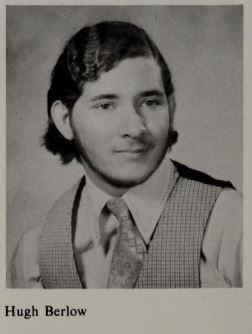
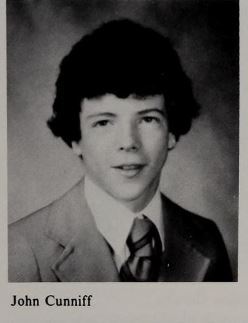
Naturally, neither of us had aged a bit.

The question is: How do you go through 42 years in the space of two and a half hours? First there are the bullet points, the highlights. You know — school, jobs, marriage(s). And then you hit the Way-Back Machine and start referencing stories and anecdotes. Either one of you may remember the others’ references, but if you don’t, oh well!
What was important for me was learning that someone I went to school with had carried forth and was living a good life. In essence, it validated our upbringing in a small suburb of Boston. Both the Irish Catholic kid and the Jewish kid had hard-working parents who only wanted the best for their children, wanted to make sure their lives would be better.
I’m sure someone of today would take issue with our verbiage or our jokes or some of our insensitivities. We were not perfect kids; we are not perfect adults. But the consideration and compassion that was instilled in us certainly made us better people.
In reflecting on this brief reunion, I realized my formative years laid the foundation for my deeply passionate creative yearnings. With books in every room of my house, classical and popular music records, and parents who were into antique collecting, there was no way I would not have followed the path I took. Yes, there were speed bumps and pot holes along the way. Happily, the engine still runs.
Whether or not I shall ever see Jack Cunniff again is certainly the stuff of Fate. However, this brief reunion made me realize how proud I am of my life thus far and motivates me toward the journey yet ahead.
September 7, 2022
“ARK CITY CONFIDENTIAL” – EXCERPT
ARK CITY CONFIDENTIAL is the first book in a historical crime fiction series that takes place in the small Kansas town of Arkansas City. Referred to in its day as “Little Chicago”, it was, like many other towns in the general geographic area, a key hideout for gangsters from up north trying to escape the heat.
Baron Witherspoon is a facially scarred World War I veteran with haunting dreams and identity issues. He lives a simple life as a beat cop. While respected by his peers and appreciated by the citizens, few people know of the traumas he experiences.
The first book takes place in 1934. A seemingly well-to-do man has moved into town but doesn’t appear like the down-and-out guy he makes himself out to be. Both Witherspoon and the chief of police have doubts. It occurs to Baron this man might be a key to his past.
“What city did you come from?” I asked as nonchalant as I could. His face changed from big and broad and outgoing to all scrunched up as though he didn’t want to let me guide the discussion.
“Chicago.” It seemed like it was painful for him to say it.
“Oh, really. Where about?”
“A neighborhood you probably never heard of.” That smile was coming out, like the sun peeking through the clouds after a storm.
“Try me.” I smiled, all friendly like, but closer to being a cat cornering a rat.
Mr. Hale’s swagger returned, figuring he could say what he wanted with the notion that I hadn’t been more than fifty miles in any direction of this city.
“Called Lincoln Park.”
“North Side, right?”
“You’ve heard of it?”
“I’ve heard of it.” My face went blank, stiff, cold. I was surprised neither the doll nor the guy made any comment about my scars, didn’t ask any questions, just accepted me like it was a normal thing. He never looked away from me, didn’t let the sight of my scars dissuade him. This told me he was either polite or had seen far worse.
He gave me his big confident smile, and nodded. He couldn’t tell if I was a book smart farmer boy or something else.
The first book in the Ark City Confidential chronicles is available as paperback, on Kindle, and through Audible.
September 3, 2022
SUSPENSION OF DISBELIEF
When I started working from home at my last job, I had to replace certain rituals. I used to go in early and use the gym and shower there, watching ESPN or whatever other show would keep me entertained for 45 minutes or so. At home, I had some weights, a treadmill, but no t.v. in the basement.
I quickly discovered podcasts. Upon looking further, I came across the Great Detectives of Old-Time Radio hosted by Adam Graham. He is a unique character whose passion for this genre comes through quite clearly. He has a great many resources and provides exquisite information about the actors, writers, producers, and sponsors.
There were a few radio shows I was familiar with already but listening during my workout for the past two plus years has been an education and an inspiration. What is absolutely vital for the enjoyment of these shows is the suspension of disbelief. I say this because shows from the 1940’s and 1950’s were being presented to audiences who had far less technological skill and awareness than we do today. Even further, sometimes our supposed “smarter” generation does not realize the contemporary t.v. shows and movies are not nearly as accurate as we believe them to be.
If you were a family sitting in front of the radio after dinner in post World War II America, you were not going to stop and comment upon some error of logic or verbiage that seemed out of place. Listeners in 1938 had to be told on multiple occasions there was no alien invasion despite the best efforts of Orson Welles and his talented crew to convince us otherwise.
When I read a piece of fiction now, I notice sloppy writing more than errors of logic. I do not consider caliber of bullets as much as caliber of character. Too much dialogue or not enough. Elaborate description that takes me away from the story or not enough so that I don’t know where I am.
I am looking to be entertained and am willing to overlook a great deal. Just don’t insult my intelligence or write poorly.
August 31, 2022
SMORGASBORD
I have long owned a pasta extruder and grinder attachment for my KitchenAid stand mixer. I have experimented with herbed pasta, thin spaghetti, bucatini. I am hoping to add tomato or spinach or even pesto directly to the dough. I have ground chicken breasts and thighs and made stuffed sausage. Italian, bratwurst, tomato basil, and even a personal blend. I am still looking forward to attempting Andouille.
When it comes to cooking, I am somewhat adept at Asian stir-fry, several Mexican creations, many quality Italian dishes, and have even put together a completely homemade pizza, where all the ingredients where home made or home grown. I am seeking out Brazilian, Hawaiian, and Portuguese recipes.
I have stated often in the past that my two primary creative outlets are cooking and writing. I find myself at greater peace when occupied with one of these two avocations. It is the notion of putting disparate elements together and presenting a greater whole, something enjoyable or entertaining, and definitely an item to be remembered.
My writing has evolved into a smorgasbord of styles and genres and interests. I started young with short stories, studied screen writing in college, ventured into poetry during a Bohemian time in my life, and circled back around to full-length fiction. But, even then, I stepped back in time, embracing historical fiction much in the same way you enjoy a Cardigan in a New England winter.
On a recent post, I referenced several works in progress. Perhaps I inadvertently implied I was working on all those pieces simultaneously. By way of elaboration, I have printed that list, color coded it, and pinned it up on a corkboard in my office. Much as a visitor to a brand new restaurant, I choose to work on what might be prudent on any given evening, based on time or mood.
For some reading that, there is the notion that it might take longer to complete something, especially given the need to rewrite, edit, then of course present a finished work to a publisher and, further still, market a piece. To all that I say “True.” The thing for me is these various works are in decidedly different genres. While there is a new historical crime series (with the first book nearly complete and only an outline for the second), the others include a retro pulp piece, a possible attempt at an alternate history story, and a short play, as well as a reworking of a transgressive novel and an elaboration on a metafiction.
These are the sausages and pasta and cuisines. Just as I would not crack open a can of soup every night and slap some packaged deli on a couple of slices of bread, I no longer feel comfortable merely running in the same track. It behooves a writer, any writer within any specified genre, to revisit the craft of writing. Whether that means reading or re-reading books on writing, or taking classes or seminars, or branching out into other genres, staying put does not enlighten you nor does it advance you.
It is only by advancing, sharpening and honing one’s skills, focusing on craft, that the act of creativity is purified, like blown glass in a kiln. Lack of progress to a creative person is a living death. As Frost most definitively said “I have miles to go before I sleep.”
Heck, I might even go back to writing poetry.
August 27, 2022
BOOK VS. MOVIE
For as long as I can remember, there has been the debate as to whether a movie was better than the book from which it was made or vice versa. The literary purist will always be on the side of the book, praising an author’s descriptions and handling of the plot. Those who prefer their entertainment in a visual form will admire how the film was made and have little regard for any differences from the original text. As a writer who also studied filmmaking and screenwriting, I have come to realize they are two separate entities that have to be reviewed and accepted on their own merits.
I recently re-read Patricia Highsmith’s masterful psychological thriller “The Talented Mr. Ripley”, the version of which was a tie-in to the 1999 film, with Matt Damon, Gwyneth Paltrow, and Jude Law on the cover. Naturally, this begs a comparison.
The homoerotic aspects of the film are far more enhanced than the minimal reference to “queerness” in the novel. This could be due to the time period in which is was written (1955) versus the year the movie came out (1999). That being said, it did not play as significant a part in the book. Tom Ripley is clearly enamored of Dickie Greenleaf and tries desperately to share the lifestyle, presumably with Dickie. The movie indicates a love aspect on Tom’s part several times, both in his dressing down of Dickie for having sex with Marge on the boat and showing no responsibility for getting a local girl pregnant.
Dickie and Freddie Miles seem to be impediments in Tom’s intent to maintain a desired lifestyle in the book. He kills Dickie because, well, he can. He doesn’t really want to kill Freddie but, oh well, he has to. In the movie, Jude Law plays Dickie as pretentious and selfish. Philip Seymour Hoffman’s Freddie is uncouth. We cringe at their deaths in the book but almost half expect it in the movie.
Tom’s ultimate goal is a life of leisure, adventure, and intellect that he will find throughout Europe. He winds up with the resources to do just that. The only cost is a lingering paranoia. The movie Ripley has both homoerotic fantasies and desires but is able to present a charming partner to Cate Blanchett’s Meredith. Whether the movie Tom is capable of consummating the relationship is uncertain. His primary desire is summed up in the line: I always thought it would be better to be a fake somebody than a real nobody. (This line does not appear in the novel.) Again, however, the only cost is a lingering paranoia.
The movie is exquisitely produced. Costume and production design are impressive. The cast features Academy Award winners and nominees. The director was the renowned writer-director Anthony Minghella, himself an Academy Award winner. There is no way to not enjoy this production.
If, however, you compare it to the novel, you might question the choices made, such as the inclusion of Meredith Logue (simply done because Minghella was impressed with Cate Blanchett and wanted to write a role for her) or the pregnancy of the local girl. Paltrow’s Marge comes across as a girl uncertain of her relationship with Dickie who flies off the handle at the thought that Ripley may have murdered him. In the novel, she is simply an annoyance to Tom, perhaps disgusted for her reference to his “queerness” he had discovered after the fact.
Matt Damon, fresh off “Good Will Hunting” comes across as banal (by intention) but cunning, capable of impersonations and forgery, which he brags about gleefully. His emotions are bottled up, until he explodes in a rage against Dickie and Freddie. The scary thing about the book is that you are on edge at every occasion where Tom may be caught in his treachery. To root for a very smart sociopath is the skill that Highsmith possesses.
At this point, I am not going to set myself down and watch the movie after recently finishing the book. I want to allow that experience to linger. I want to enjoy the writing and consider who it is I have just followed and try to determine what there is or isn’t to like about Mr. Ripley’s talents.
August 24, 2022
PHILIP MARLOWE
Since I’m rooted in the hard-boiled style and film noir genre, I’d have to say my favorite fictional private investigator is Philip Marlowe. Dashiell Hammett was far more detailed and accurate in his creation of the Continental Op and Sam Spade, having had first-hand experience in the field. What Raymond Chandler focused on was character. Reading his biography, you get the distinct sense Philip Marlowe is the detective Raymond Chandler wanted to be. The character is so infused with many of Chandler’s traits. He’s just better looking and tougher than Chandler had the capability of being.
I have come to realize that Marlowe is my favorite because I own or have seen more movies with the character, and listened to more radio episodes than any other detective (the seven seasons of Bosch on Amazon Prime notwithstanding). Much like Chandler, my new historical crime fiction series features a private detective that is closer to me (temperament and personality) than any other character I have written. With that in mind, I wanted to focus on those encounters I have had with Philip Marlowe.
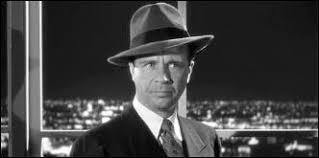 Dick Powell
Dick PowellWhen your name is H.B., you tend to lean toward as your favorite actor. While he is the most recognizable incarnation, he was not the first. Dick Powell, the successful song-and-dance man, brought Marlowe to life in “Murder, My Sweet.” This was based on “Farewell, My Lovely”; the name change was so as not to confuse audiences that it was another musical. Powell slips easily into the hard-boiled wardrobe just nicely. His snappy delivery of dialogue and less-than-superhuman abilities make him a detective for the people. He drinks, he smokes, he flirts, but he is desperately trying to get to the truth. This role likely allowed Powell to continue on with his career after he had grown too old for the lead in musicals.
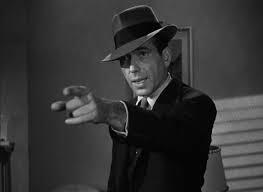 Humphrey Bogart
Humphrey BogartBogart had already played Sam Spade. When he filmed “The Big Sleep” in 1944, the ingénue playing opposite him soon became lover and then wife. The film was delayed for release until 1946 so that the Bogie-Baby pair could generate some real heat. He, like Powell, gets beat up but keeps coming back. They both exhibit a personal code despite others thinking them to be mad fools. There is nothing imprecise about the performance. Like his Sam Spade five years earlier, he inhabits the character as easily as stepping into a warm bath.
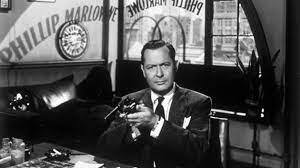 Robert Montgomery
Robert MontgomeryRobert Montgomery both starred in and directed “Lady in the Lake”, with Audrey Totter and Lloyd Nolan offering magnificent supporting noir roles. The movie was made with a gimmick: It was filmed as a first-person narrative. Everything you see is through Marlowe’s eyes. You only see Montgomery when he is in front of a mirror. Stylistically, it matches the first-person fiction narrative. But I was too caught up in the “trick” that I couldn’t tell you how well Bob Montgomery came across as the character.
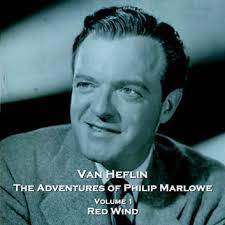 Van Heflin
Van Heflin
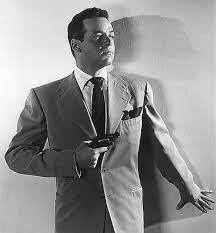 Gerald Mohr
Gerald MohrAround that time, and Gerald Mohr both provided their vocal cords to Marlowe on radio. Heflin comes across as world-weary, at times almost bored. He seems to be cleaning up the mess more than delving deep into the abyss. Mohr, on the other hand, adds a certain oomph, not afraid to mix it up, hit or get hit, while throwing in some charm in the middle of his snappy dialogue. He is the radio version of Dick Powell.
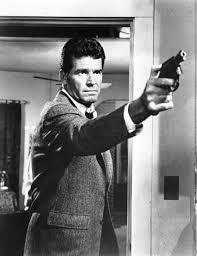 James Garner
James GarnerIt was 22 years before Marlowe came to the screen again, this time in the person of . He, too, carries a certain honor with him but he seemed to feel more at home in the Jim Rockford mode. The convoluted story based on “The Little Sister” keeps your mind more occupied trying to unravel the various complexities. Garner does well, but could have used a better script.
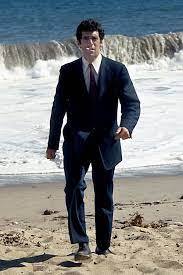 Elliot Gould
Elliot GouldRobert Altman does not seem the type of director to take on a crime story. Then again, Robert Altman makes movies in his own genre. Perhaps that is why portrayal has been dubbed Rip Van Marlowe. Gould spends the first part of the film looking for his cat’s preferred food from an all-night grocery store. He’s constantly smoking and always on the wrong side of the cue ball. Eventually, he works it all out and adheres to his code as well.
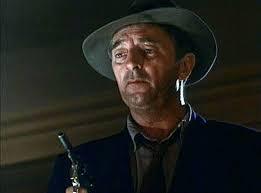 Robert Mitchum
Robert Mitchumis an icon of film noir. His voice and laid-back manner fit in with just about any story. I would like to have seen him as Marlowe in the early to mid 1950’s. Sadly, the only man to portray Marlowe on screen twice played him when he was fifty-eight and again when he was sixty-one. The mood and atmosphere were still there. He just appeared too tired for the part.
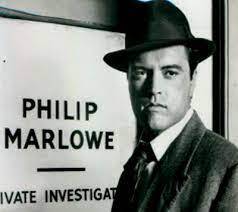 Powers Boothe
Powers BootheI had the opportunity to catch the second season of HBO’s Philip Marlowe, Private Eye from 1986 on Amazon Prime featuring Powers Booth. The six episodes were based on classic short stories. The overall production was clean but it had the look of a t.v. show. Booth was on par with Garner but with better scripts. It would have been interesting to see him in just one full-length movie.
I haven’t seen the earlier films where the Falcon and Michael Shayne are substitutes for Marlowe, “The Brasher Doubloon” with George Montgomery, nor listened to the three other radio performers, neither am I mentioning the forthcoming film with Liam Neeson (who will be 71 when the film is released in 2023).
To be honest, I don’t have a favorite in the bunch. The character, like most characters, has many aspects and nuances that each actor brings to the table in a different manner. For my money, it all starts with Raymond Chandler creating a solid and viable private detective with enough personality traits that any decent actor would wish to portray. As with most good mysteries and crime fiction, the resolution is about more than solving a crime. It’s about getting to the heart of a deeper, personal human matter. That counts for something.
August 20, 2022
A WRITER’S JORNEY, PART 6
Oklahoma Writers Federation Inc is an organization made up of affiliate writers groups from Arkansas, Kansas, Texas, and, of course, Oklahoma. By stepping into that world, I was breaking out of the limited confines of an organization that was primarily created for Wichita, Kansas area writers. The boundaries had widened. The horizons became greater.
I made friends, allowed a gregarious nature to ingratiate itself among writers of many genres as I came to understand we had a collective sensibility. Regardless of age, genre, writing or publishing experience, the trials and tribulations of the one were almost equal to that of the many.
Previously, I had ventured into self-publishing, using the Lulu.com platform. My editing and formatting skills were nothing short of atrocious. The sole reason I opted for this was to provide my late parents with something tangible as a gift for their support and understanding throughout the years. Many years later, I came to realize my initial efforts were considered novellas. There was character and flair and some decent writing but nothing that was going to turn any heads.
I ventured from novella to novel in the contemporary crime field. Between the K.W.A. and the O.W.F.I. conference, I caught the eye of a publisher in Texas. Though currently out of print, my first two actually published novels, Swan Song and The .9 MM Solution, made me believe I could write fiction. Full stories, fleshed out characters, plots with some degree of intricacies. Again, retrospect allowed me to see it was better than before but nowhere near where I should be at that point in my life.
After my first attendance at the conference in Oklahoma, I returned to Wichita, accepted the position of President of K.W.A., and put on the last writers conference that organization has had in 2013. Promoting and assisting other writers was gratifying, but the drain it put on me with regard to my own output caused me to leave the organization. I felt I was on the cusp of something deeply personal; being a mentor was admirable but holding me back.
Seeking out new material, I fell back to the stories my wife’s now-late uncle told me regarding the town of Arkansas City, Kansas. With a nickname of “Little Chicago” and various underground tunnels, I began to shift my focus to historical crime fiction. It was certainly a challenge. I had to discard fancy new weapons, computer technology, and verbiage ingrained in me from my own upbringing. I took what I learned from my previous ventures into the genre and reconfigurate them for a time seventy to ninety years prior. A new publisher, The Wild Rose Press took me on. From 2016 to 2021, I published four books in the series known as the Ark City Confidential Chronicles:
Ark City Confidential, Secrets of the Righteous, Lost in the Plains, and From Somewhere in a Dream.
I had the honor of being on the faculty for the 2021 O.W.F. I. Writers Conference. I’ve expanded my social media presence (as much as a married homeowner with a full-time job can). And the writers I have come to know within the last ten years are truly good friends.
I have recently taken the liberty of re-evaluating past works for viability and future projects for interest. There are no less than 10 irons in the fire (outlined previously here). No, they are not ALL ongoing nor being juggled on a daily basis. However, I printed out the list and work on what seems feasible within the confines of my schedule.
As I get older, I find there is a definitive need to exert my creativity for the sole purpose of holding on to my humanity. There will always be cooking and baking, but writing takes me places beyond the confines of place and time and corporeal being. And, just perhaps, I can take someone along on my journey.
So, here we are. Up to the present. However, as before, but for different reasons, there is no resting on imagined laurels. Writing and the Art of Creativity demands a forward thinking process, a constant re-evaluation, and perhaps, change in the name of growth. That’s what this whole series has been about.
I wish you the greatest happiness on your journey.
August 17, 2022
A WRITER’S JOURNEY, PART 5
When the people you work with are anywhere from eight to ten years younger than you, you tend to notice someone closer to your age who starts working there. She indicated she worked full time at an ad agency and this was just a second job to defray the costs of moving back home to Wichita, KS. I was immediately smitten with her. That turned into deep affection and finally love. I had to make a decision pretty quickly: it was February 1995 and she was moving in August.
It could have been nothing more than a fling, an affair akin to “Summertime” with Katherine Hepburn. But there was something tugging at the back of mind that I couldn’t let her go. By that, I never thought of keeping her in Boston. More like I might just have to follow. My dream as a youth of living and working had been fulfilled; now it was time to pursue new dreams.
If you know me (or you are just good at guessing), this is my wife I am referring to. We’ve been together for twenty-seven years, married for twenty-four. Now, this was a scary venture for both of us. I didn’t know if I would like Wichita; she didn’t know if I would like Wichita. What would happen to the relationship if I didn’t? Transitions are painful and require discipline and patience. I had the latter in abundance; the former was still being developed.
I did very little writing initially, maybe a poem here or there before or after work. The focus really was on developing this relationship, making sure it had meaning and a true bond. Readjustment can take a long period of time. I came across an ad for Project Greenlight developed and produced by Ben Affleck and Matt Damon. This Boston guy was taken with those Boston guys. I learned how to use my wife’s computer and reworked an old screenplay. Unfortunately, I did not win anything but I did finally get off my duff.
Years went by and I did very little writing. I satisfied my artistic jones by doing some Jackson Pollock-inspired painting with cheap canvases and “oops” paint purchased from home repair stores for very little. It was a way of confirming a sense of creativity, even if it wasn’t in a discipline I felt completely comfortable doing.
I took the plunge and attended a meeting of the Kansas Writers Association and met local writers. I entered their writing contest and placed in a couple of poetry categories. I attended their conference in 2012. I entered the Pitchapalooza which was hosted by The Book Doctors, Arielle Eckstut and David Henry Sterry, and apparently impressed a few people. The folks at K.W.A. encouraged me to attend the O.W.F.I. Writers Conference. My world, writing and otherwise, was about to get bigger.
NEXT: The world of fiction…and beyond!
August 13, 2022
A WRITER’S JOURNEY, PART 4
My options in 1990 were a personal computer or a word processor. I knew computer geeks, such as they were, back in high school. My understanding was these guys had mathematical abilities, of which I was limited. Even though personal computers had evolved by that time and were soon to take off, I opted for a Brother Word Processor. To me, it was like a typewriter where I could print AND store my work. (Oh, and by the way, I still have that relic, now 32 years later.)
The notion of writing and revising and editing as well as saving impressed me. It encouraged me. I didn’t have to rely on pencils and pens and notebooks (although they were far easier to carry around for those burst of inspiration). I could wipe the slate clean or revise and enhance. That simple ideal pushed me forward.
I had a crap job and meager living situation. But I was close to the subway and could access Boston easily. The fact that the subway didn’t run past eleven p.m. meant I would have to curtail any socializing I would desire. All I was truly interested in was being immersed in a place I had longed to be a part of since I was a boy. The city had not only newspapers but also independent periodicals, rag mags, that identified the artistic goings on in the city. It was from one of them I found a poetry reading.
The first time, I went into the city prior to this reading, found a restaurant where I ordered a Caesar salad with anchovies and a glass of red wine. For several years, this would be my go-to treat. The reading series, at first called the New Writers Collective, contained a highly disparate group of people. Wishing to simply gather an understanding of what this was all about, I sat in the back, listened to the featured speaker, listened to those who had signed up to read, observed, and took in as much as possible.
Two gentlemen approached me after and introduced themselves. so there is no need to rehash it here. However, I now had a word processor. I was living in Massachusetts, a few subway stops from downtown Boston. And I became someone and started making friends.
The period from 1990 to 1994 was the most productive for me from a poetry standpoint. However, one could consider it an overall literary education. I was surrounded by all types of writers and artists. Again, this is during a time of no internet and very limited technology. I went to the library, sat for hours reading, and then took out books to bring back to my home, such that it was. I sat outside on park benches or in coffee shops. There were jokes and playful teasing. There were friendships based on deeper and more meaningful connections.
It was an education unlike college. Ideas were free flowing. Experimenting was how one developed one’s craft. Not to mention poetry readings where you would have to “put yourself out there” and present your work. The culmination of my efforts was my Charlie Parker inspired long piece, “Ornithology” (previously discussed here). It was a glorious time.
But just like the post-college Bohemian days, there was no direction, no desires other than submitting a poem to a magazine or literary review. A few attempts at fiction, a couple of rejection letters from agents, are now treasured memories. I had a better job, made a little more money, and even had a checking account. Writing was developing. My appreciation for a variety of forms was being enhanced. My learning was increasing. But without the balance that life can provide, my development as a writer was almost meaningless.
That’s when I moved to Kansas.
NEXT: She set it all in motion.
August 10, 2022
A WRITER’S JOURNEY, PART 3
You realize you are living a dead end life. You are not going anywhere, except back to the beginning of a circle where you start over, go to the end, and start over again. Your mind is clouded by routine and boredom. You occasionally put pen to paper and scribble a few words creating a poem and it briefly reminds you of your humanity.
Some things you do out of love. Some things you do based on delusion or illusion. Somethings you do for all the above.
So, when you meet a dynamic woman, several thoughts cross your mind. The state of being in love. Being a protector. Escape. If trying to recapture memories of writing prompts in first grade is difficult, clearly identifying emotional response from thirty-five years ago is not any easier. I remember only what suits me to exist emotionally today.
All told, from meeting to dissolving the marriage was eighteen months. There was no writing in that time period, except from a Miami Vice episode written on spec in the hopes that someone who knew someone MIGHT be able to get it into the right hands. What that time did for me was to create an emotional state conducive to a vast literary output. An eventual literary output. Perhaps a dozen pieces from that time period are worth discussing. Mostly maudlin, woe-is-me. Heavy use of sonnets. Dark, depressing, not quite suicidal, but utterly hopeless in nature. Still, however, lacking any originality and the only craft a reliance on established forms.
There was a brief period where I lived with my parents. It was during that time I attempted my first novel intended as an entry in the Turner Tomorrow Awards. It was another dystopian (there I go again!) tale based on the Rip Van Winkle story (again being derivative!). At least, I can pinpoint the start of my fiction phase. Along with that was a complex, almost experimental novel inspired in part by the killings of the Gainesville Ripper. And therein was my first interest in crime fiction.
From August 1988 to early 1990, I moved from Florida to Connecticut to Northern California to Southern California to Florida and finally to Massachusetts. While in California, there was a collaboration on a screenplay regarding the Katyn Massacre during World War II, submissions of screenplays that were easily rejected, and more poems, some venturing out into free verse. I was almost like Odysseus after the Trojan War, just not nearly so heroic.
This was a phase of writing while slipping further away from a solid life or lifestyle, giving up a job and apartment in Connecticut because I didn’t have a car, living with a college friend in California who had a fantastical view of life, being forced to live with my parents, gaining a stake and moving back to Massachusetts. I finally rejected the paradise-that-wasn’t of Florida and the dream of Hollywood.
It was one purchase of a bit of archaic technology that started my serious ventures in writing.
NEXT: Going home



